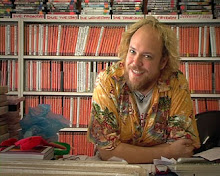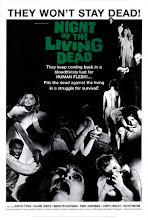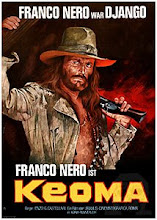19th October 2007: TRINITY double! They Call Me Trinity
They Call Me TrinityThere have been many western parodies over the years – Blazing Saddles to name the obvious – but there’s none more iconic and with more reverberative effect on European pop culture, than the 1970 They Call Me Trinity.
It stars Terence Hill and Bud Spencer, who were destined to become two of Italy’s most popular comedians. As generic cogs in Italy’s B-film factory, they had been paired before in a semi-successful trio of spaghetti westerns in the Sixties. It would take Enzo Barboni aka “”EB Clucher”, a former cameraman on several of Hill and Spencer’s solo outings in his first film as writer and director, to achieve the perfect balance of silliness and knock-around action for the duo. And as soon as the character of Trinity emerges from the desert carried behind a horse in his soiled and tattered long-johns and covered in filth, wolfs down a pan of beans and then shoots two gringos without raising an eyebrow, you can tell Terence Hill’s true screen persona has finally emerged from behind the grime.
Trinity joins up with his half-brother Bambino, an anti-social ox and career criminal who’s unwittingly become the new sheriff of a town more or less run by Major Harriman, a not-so-fine Southern gentleman played with sherry-swilling smarminess to perfection by American expatriate Farley Granger. The Major hires a motley gang of gunslingers and Mexican banditos to run a herd of Mormons out of the nearby valley so he can graze his cattle on their land. Bambino, on the other hand, wants the Major’s cattle, and Trinity, ever the ladies man (note the plural), has his eye on one or both of the Mormon leader’s daughters. As always, their sociopathic self-interest is mistaken by all and sundry as philanthropy, and once they teach the peace-loving Mormons how to “slap the other cheek”, they score another win for the Me Generation of the 1870s.
They Call Me Trinity has all the trappings of a traditional spaghetti oater, but its perfect timing with the then-novel comedy angle and inherent chemistry of Hill and Spencer made it a huge worldwide hit, setting the template and making the on-screen couple more than bankable in an increasingly silly series of comedy vehicles over the next fifteen years. Bud Spencer aka Carlo Pedersoli is Hill’s perfect foil, alternating between gruff, surly, deadpan and ludicrously ambitious. Hill plays the blue-eyed wily trickster and seeming innocent to the hilt, congenitally lazy but with lightning hands and a master acrobat, and all the time with a huge grin that charms and disarms all in its path, including his sociopath half-brother. As childishly simple as it sounds, it works, and as with all truly successful comedy duos, the formula continues to work after almost forty years.
They made a staggering seventeen films together, but despite the ”Trinity” retitlings of just about every Hill and Spencer film made together or apart, there are only two Trinity films: the 1971 sequel Trinity Is Still My Name, coming soon to Schlock Treatment, and this, the quintessential spaghetti western comedy They Call Me Trinity.
 My Name Is Nobody
My Name Is Nobody
When I was a young lad, my father told me the one about the two bulls sitting on the top of a hill looking down on a paddock full of heifers. The young bulls says, “Why don’t we run down and schtoink one of the cows?” “Well son,” says the old bull, “we can always walk down and schtoink them all.”
Which seems appropriate when introducing My Name Is Nobody, an eccentric spaghetti western full of fables, parables and comic one-liners. The film is signed by Tonino Valerii, who started as Leone’s assistant on A Fistful Of Dollars (1964) and For A Few Dollars More (1965) before helming his own well-crafted and critically acclaimed westerns The Price Of Power, Day Of Anger and A Reason To Live, A Reason To Die. But it’s Leone’s assured hand – as producer, co-writer and uncredited co-director – which is detected in every scene, in the complicated camera trickery, obsession with detail, and ultimately in the film’s heart and soul. My Name Is Nobody is about the myth of the West, told as more of a Greek fable than the tableaux-driven but still mythos-drenched Once Upon A Time In The West.
On first viewing My Name Is Nobody doesn’t come close to Leone’s best work – it’s by no means perfect, and at times seems like a schizophrenic crowd-pleaser which can’t decide if it’s a Leone western or a Trinity comedy. But even the great Western directors took time off their po-faced epics to show their more gentle, humourous side. Sam Peckinpah followed up The Wild Bunch with The Ballad Of Cable Hogue, and Leone here pays tribute to Peckinpah in a number of ways: casting his long-time collaborator RG Armstrong in an uncredited cameo as “Honest John”, and including Sam’s name on a wooden cross in the gunslinger’s cemetery. It’s just one layer in a complex film that’s referential, reverential and self-effacing, and all within the same frame.
The film is set in 1899, Leone’s arbitrary turning point between the “Old” West and the “New” (and we’re talking cultural contructs here, not history). The “Old” is of course represented by Henry Fonda, a true icon of the western genre and a glaringly obvious link to Leone’s previous masterwork Once Upon A Time In The West (1968), in which he played the blackest villain of his career. In Nobody… he’s Jack Beauregard, a jaded, time-worn gunfighter who’s decided to throw in his reputation as the Fastest Gun in the West while he still has two moving arms to throw with. The “New” represented by Terence Hill is a cocky newcomer, showy to the point of show pony, a “Nobody” who desperately wants to be a “Somebody”, and who idolizes Jack to the point of rattling off his bona-fides like facts off a baseball card. “Nobody” wants Jack to retire too, but in a pine box after his final blaze of glory, and either plans to be a witness or protagonist in the event via an increasingly complicated series of set-pieces he stage-manages to inflate Jack’s reputation further It culminates with Jack’s showdown with a 150-strong gang of mean cutthroats known as “The Wild Bunch” (another nod to Peckinpah), which provokes Jack and Nobody’s relationship of master and apprentice, or possibly father and son, to its logical conclusion.
Terence Hill’s star was at its peak in 1973 – in Europe at least – and My Name Is Nobody buys completely into the newly yet firmly-established Trinity schtick, from its title to poster art, to Nobody’s lazy jester posturings and lighting fast slap-and-draw antics stolen directly from They Call Me Trinity. It’s a stark contrast to the West as imagined by Leone and Leone’s major influence John Ford before him, and yet somehow the combination works, even in Ennio Morricone’s almost jangle-pop score, which should be annoying as hell, and is instead weirdly memorable.
“There wuz never any good old days” a grizzled Henry Fonda pronounces, and you know he doesn’t mean it. There’s a real nostalgia for the “old” in what would be both Henry Fonda’s AND Sergio Leone’s farewell to the western genre. We are proud to present the schizophrenic western comedy My Name Is Nobody.























































































No comments:
Post a Comment